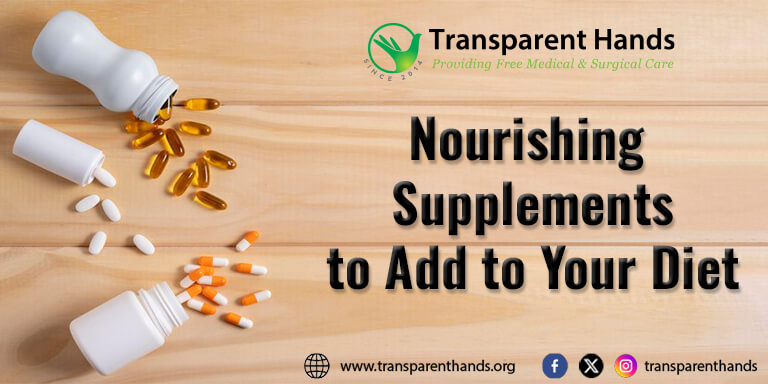Nourishing Supplements to Add to Your Diet

A recent report by the World Health Organization (WHO) highlighted that around 390 million adults in the world were underweight, and undernutrition is linked with almost 50% of deaths among children who are 5 years old or younger. To function smoothly and efficiently, you need to nurture your body with adequate nutrition, diet and exercise. Nourishing supplements are an ideal way to maintain healthy and effective functioning of the human body. Here are five nutritional supplements which could do wonders for your health if regularly included in your diet.
Omega
Omega -3 fatty acids, especially in women, typically conjure images of glowing skin. However, these polyunsaturated fats go way beyond maintaining skin health. According to the NHS, these nourishing supplements could have multitudinous health benefits like raising good cholesterol and lowering blood pressure.
These unsaturated or “healthy” fats reduce inflammation in the brain and body, thereby reducing the risk of physical and mental conditions like heart disease, cancer, rheumatoid arthritis, Alzheimer’s disease, dementia, anxiety and depression. Omega-3 fatty acids play a crucial role in a healthy pregnancy and support the healthy development of infants. It’s also the panacea for fatty liver and may help improve ADHD.
Studies conducted by Cleveland Clinic show that Omega-3 fatty acids could be procured through seafood or plant.
While fish like mackerel, tuna, salmon and herrings are suffused with the benefits of Omega- 3 acids; it can also be procured from nuts and seeds especially flaxseeds, chia seeds and walnuts. While a few like getting their Omega acids from sources like flaxseed oil, soybean oil and canola oil; others prefer eating their way into this supplement by consuming fruits and vegetables like avocado, mango, berry, raspberry, mango, beans and spinach.
Though the benefits of Omega-3 fatty acids can’t be denied, there are conditions in which they can’t be used in excess. Hence, it would be advisable to consult a licensed medical practitioner before including these nourishing supplements in your diet.
Vitamin D
The significance of a nutritional supplement like Vitamin D can’t be emphasized enough. It is a key vitamin instrumental in maintaining healthy bones, teeth and muscles. Its deficiency could have disastrous consequences for children as well as adults – a deficiency in this nourishing supplement might cause rickets in children and a condition known as Osteomalacia in adults. According to the NHS, children above the age of 1 and adults need 10 micrograms of Vitamin D per day.
While dermatologists recommend that a 20-minute exposure to sunlight (without sunscreen) could meet one’s Vitamin D needs, factors such as clothing etc. could hinder its absorption. Hence, it would be advisable to also get one’s vitamin D from red meat, certain types of fish, egg yolk and liver (not recommended for pregnant women). It should be taken within prescribed limits as excess of it might lead to increased calcium deposits in the body damaging one’s vital organs.
Vitamin B12
Vitamin B12 is a key nourishing supplement that keeps your nerves healthy. It is also instrumental in helping the production of DNA and blood cells, and maintaining optimal brain function. Since B12 is found only in meat, eggs and dairy products, vegetarians are at potential risk of developing this deficiency. Others who are at enhanced risk of developing this deficiency are patients with intestinal conditions, those who have had stomach surgery, the elderly, and pregnant and nursing women. Proven ways of increasing the quantity of Vitamin B12 in the body are by consuming animal liver and kidneys, clams, beef, tuna, nutritional yeast and dairy products. Vegetarians can opt for fortified cereals to prevent this deficiency. A condition called pernicious anemia is sometimes caused by the lack of absorption of B12, which needs serious medical attention.
Probiotics
According to some studies, some of which are preliminary, probiotics are linked with our digestive health and immune response. Recent studies have also shown a link between gut health and brain health. Yogurt, with its beneficial bacteria like Lactobacillus, can be considered a top-notch probiotic followed by fermented milk, fermented vegetables (Kimchi), dishes containing vinegar, fermented East Asian soups such as Miso, and certain types of fermented teas. However, be cautious of overdoing probiotics as they might upset the digestive system and disrupt the natural balance of gut bacteria.
Magnesium
This supplement is known as the original chill pill for a reason, as it is known to foster relaxation and promote good sleep. If you are ever having a stressful day, magnesium helps that edgy feeling disappear! It is mandatory for protein synthesis, muscle and nerve function, blood glucose control and blood pressure regulation. According to the National Institute of Health (NIH), magnesium is found in nuts like cashews, almonds, peanut products, raisins, brown rice, and fortified cereals and so on. Not many may be aware, but the fun fact about this “happy pill” is that it aids the absorption of calcium thereby making it as important as calcium if not more!
Apart from the above, there are a plethora of other vitamins and nutrients, which can be gleaned from natural sources as well as nutritional supplements. You can consider including a form of the above in your diet and eat your way into good health and well being.
Transparent Hands’ Role in Improving Nutrition
Since, according to the United Nations (UN), there were 48.8 million undernourished people in Pakistan in 2022, Transparent Hands is addressing this issue through free medical camps and preventive healthcare sessions across the country. We distribute multivitamins and nourishing supplements among the attendees belonging to impoverished communities. Our medical experts also hold preventive healthcare sessions on malnutrition to raise awareness about this health problem.
You can also play a part in improving the level of nutrition among the underprivileged in Pakistan by supporting one or more of our upcoming free medical camps.











Leave Your Comments